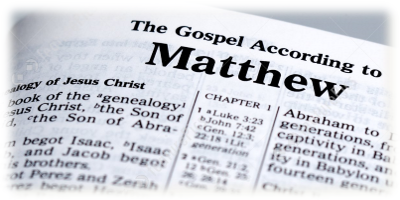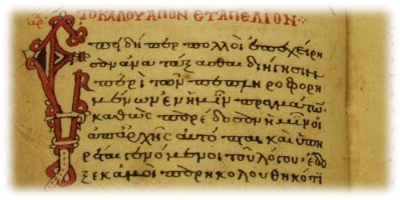While there are many textual evidences to show that the book of Matthew was originally written in a Semitic language, probably Hebrew, Matthew 5:3 is a good example of this.
Blessed are the poor in spirit: for theirs is the kingdom of heaven.
The Greek word for "poor" is ptochos and means one who is destitute, afflicted, and lacking. What this verse is literally saying is "Blessed are the ones destitute/afflicted/lacking in the spirit: for theirs is the kingdom of heaven." This does not make any sense. However, if we translate the Greek word ptochos into Hebrew we have the word aniy which also means destitute, afflicted and lacking. More literally the Hebrew word aniy means "bent down low" such as a poor person who is destitute. But this Hebrew word can also mean one who is humble, in the same sense of bending down low.
Now, if we translate the Hebrew back into English we have, "Blessed are the humble in spirit: for theirs is the kingdom of heaven." By understanding this passage from its Hebrew background, we are able to better interpret the New Testament Bible.
Another proof for an original Matthew is the overwhelming number of church fathers who had stated that the book of Matthew was originally written in Hebrew.
Papias (150-170 CE) - Matthew composed the words in the Hebrew dialect, and each translated as he was able. [A quote by Eusebius; Eccl. Hist. 3:39]
Ireneus (170 CE) - Matthew also issued a written Gospel among the Hebrews in their own dialect. [Against Heresies 3:1]
Origen (210 CE) - The first [Gospel] is written according to Matthew, the same that was once a tax collector, but afterwards an apostle of Jesus Christ who having published it for the Jewish believers, wrote it in Hebrew. [A quote by Eusebius; Eccl. Hist. 6:25]
Eusebius (315 CE) - Matthew also, having first proclaimed the Gospel in Hebrew, when on the point of going also to the other nations, committed it to writing in his native tongue, and thus supplied the want of his presence to them by his writings. [Eccl. Hist. 3:24]
Epiphanius (370 CE) - They [The Nazarenes] have the Gospel according to Matthew quite complete in Hebrew, for this Gospel is certainly still preserved among them as it was first written, in Hebrew letters. [Panarion 29:9:4]
Jerome ( 382 CE) - Matthew, who is also Levi, and from a tax collectore came to be an Apostle first of all evangelists composed a Gospel of Christ in Judea in the Hebrew language and letters, for the benefit of those of the circumcision who had believed, who translated it into Greek is not sufficiently ascertained. Furthermore, the Hebrew itself is preserved to this day in the library at Caesarea, which the martyr Pamphilus so diligently collected. I also was allowed by the Nazarenes who use this volume in the Syrian city of Borea to copy it. In which is to be remarked that, wherever the evangelist.... makes use of the testimonies of the Old Scripture, he does not follow the authority of the seventy translators, but that of the Hebrew. [Lives of Illustrious Men, Book 5]
Isho'dad (850 CE) - His [Matthew's] book was in existence in Caesarea of Palestine, and everyone acknowledges that he wrote it with his hands in Hebrew. [Isho'dad Commentary on the Gospels]

Like what you’re discovering? Continue the journey from Bible reader to translator.
|






